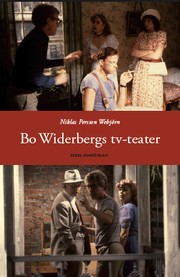
Bo Widerbergs tv-teater (Bo Widerberg)
By Niklas Persson Webjörn
Subjects: Lee Strasberg, Motion picture producers and directors, Criticism and interpretation, History and criticism.., Tennessee Williams, Bo Widerberg, Bengt Bratt, Elia Kazan, Henrik Ibsen, Thommy Berggren, History and criticism, Arthur Miller, Stefan Jarl, August Strindberg, Method acting, Lars Norén, Tv-theatre
Description: From the Press release: Bo Widerberg's unconventional method renewed TV theatre When the filmmaker Bo Widerberg began directing studio-produced TV plays in the late 1970s, his intention was to create a new type of realism in Swedish TV theatre. This is described in a doctoral thesis in film studies from the University of Gothenburg that sheds light on a less well-known – and until now largely ignored by researchers – side of the renowned director. Films such as Kvarteret korpen (Raven's End), Elvira Madigan and Mannen på taket (The Man on The Roof) made Bo Widerberg famous. However, he is less well-known as a director of TV plays. Niklas Persson Webjörn has studied the seven TV plays that Bo Widerberg directed from 1979 to 1992. The playwrights include August Strindberg, Arthur Miller and Lars Norén ‘Widerberg’s TV plays attracted a great deal of attention back in the days, and he himself caused many of the discussions in the press about his work,’ says Persson Webjörn. Widerberg made some rather provocative statements. He for example once said that Ingmar Bergman and the Royal Dramatic Theatre represented an artificial acting style and that it therefore was better to work with amateurs. Yet behind the provocative remarks there was a serious intention: to create a new type of TV theatre together with the actors. Persson Webjörn’s research shows that the role analysis was not based on the role figure but instead on the individual actors – on their personal experiences and not least on the relations between them. ‘He often picked actors for roles that contradicted their image. One example of this is when he recruited the comedians Tomas von Brömssen and Sten-Åke Cederhök from the slapstick show Albert och Herbert for the roles of father and son Ekdal in Ibsen’s The Wild Duck.’ Influenced by the American so-called method acting tradition, Widerberg developed a work method that comprised improvisation and long analysing conversations, and where the technical aspect was given less attention. In 1979 when directing his first TV play En handelsresandes död (Death of a salesman), he immediately clashed with the technical staff, who were not used to his methods. He simply brought his approach to filmmaking into the TV studio. ‘This for example meant that he didn’t use any predetermined movement patterns for his actors. Instead he ended up with a huge amount of film from which he picked the best parts in the editing room.’ After two intense periods as a TV director, Widerberg returned to filmmaking in 1995 with Lust och fägring stor. His intention was to continue cooperating with TV, but he did not have time to get involved in any more TV plays before his passing in 1997. ‘Without a doubt, Bo Widerberg made a lasting impact as a TV director. As a renewer of realism, he is in the same league as Keve Hjelm, Bengt Bratt, Carin Mannheimer and Lars Norén,’ says Persson Webjörn.
Comments
You must log in to leave comments.